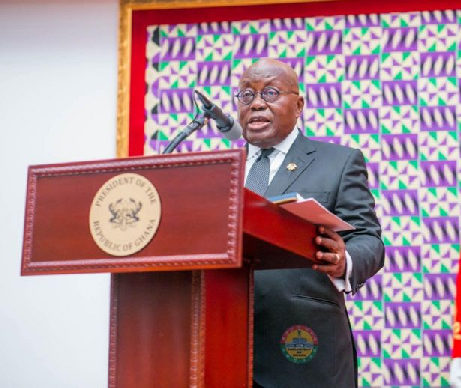What happens if Akufo-Addo refuses to assent to the anti-LGBT+ Bill

On Wednesday, February 28, 2024, the Parliament of Ghana passed the Promotion of Human Sexual Rights and Family Values Bill, widely known as the anti-LGBT+ bill.
The bill proscribes Lesbian, Gay, Bisexual, and Transgender (LGBT) activities and criminalises their promotion, advocacy, and funding.
Persons caught in these acts would be subjected to a jail term between six months and three years, with promoters and sponsors facing a three to five-year jail term.
How the bill would become a law:
The anti-gay bill, even though Parliament has passed it, is not law and cannot be implemented yet.
So, as it stands, the punishment proposed by the bill cannot be enforced.
For the bill to become a law, it would require President Nana Addo Dankwa Akufo-Addo to assent to it, in other words, approve it.
Article 106 of the 1992 Constitution of Ghana requires that the president assent to the anti-gay bill within seven days of it being passed by Parliament.
Here is what the law says:
(1) The power of Parliament to make laws shall be exercised by bills passed by Parliament and assented to by the president.
(2) No bill, other than such a bill as is referred to in paragraph (a) of Article 108 of this Constitution, shall be introduced in Parliament unless –
(a) It is accompanied by an explanatory memorandum setting out in detail the policy and principles of the bill, the defects of the existing law, the remedies proposed to deal with those defects and the necessity for its introduction; and
(b) it has been published in the Gazette at least fourteen days before the date of its introduction in Parliament.
(3) A bill affecting the institution of chieftaincy shall not be introduced in Parliament without prior reference to the National House of Chiefs.
(4) Whenever a bill is read for the first time in Parliament, it shall be referred to the appropriate committee appointed under Article 103 of this Constitution, which shall examine the bill in detail and make all such inquiries in relation to it as the committee considers expedient or necessary.
(5) Where a bill has been deliberated upon by the appropriate committee, it shall be reported to Parliament.
(6) The report of the committee, together with the explanatory memorandum to the bill, shall form the basis for a full debate on the bill for its passage, with or without amendments or its rejection, by Parliament.
(7) Where a bill passed by Parliament is presented to the president for assent, he shall signify, within seven days after the presentation, to the Speaker that he assents to the bill or that he refuses to assent to the bill, unless the bill has been referred by the president to the Council of State under Article 90 of this Constitution.
What happens if Akufo-Addo refuses to assent to the anti-gay bill?
The executive’s position on the anti-gay bill has led some people to suggest that President Akufo-Addo would not assent to the bill.
Former President John Dramani Mahama has indicated that Akufo-Addo has signalled that he would not assent to the bill if it comes with a cost to the government.
It is not clear whether the issues Akufo-Addo has with the bill have been resolved yet.
So, would the bill be thrown out if Akufo-Addo refuses to assent to it? No.
The Parliament of Ghana can pass the bill into law by itself if Akufo-Addo refuses to assent to it.
This would require 2/3 of the 275 Members of Parliament to vote to approve it into law.
Section 8 of Article 106 states that:
Where the president refuses to assent to a bill, he shall, within fourteen days after the refusal—
(a) state in a memorandum to the Speaker any specific provisions of the bill which, in his opinion, should be reconsidered by Parliament, including his recommendations for amendments, if any; or
(b) inform the Speaker that he has referred the bill to the Council of State for consideration and comment under Article 90 of this Constitution.
If Parliament insists that the bill is okay and should be passed, it can rely on Section 10 of Article 106, which states that:
“Where a bill reconsidered under clause (9) of this article is passed by Parliament by a resolution supported by the votes of not less than two-thirds of all the Members of Parliament, the president shall assent to it within thirty days after the passing of the resolution.”
Source: www.ghanaweb.com





